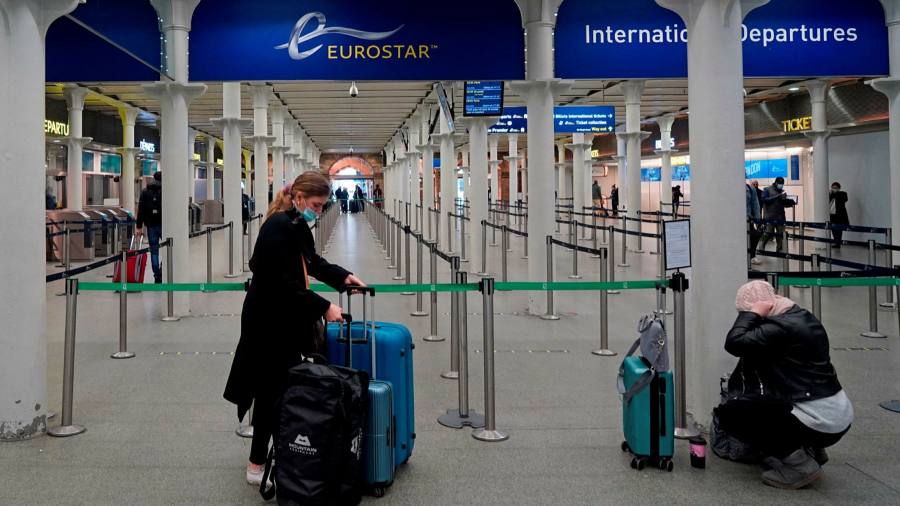An increasing number of European Union countries, including Germany, Italy, Belgium, Austria and the Netherlands, moved over the weekend to stop travel from the UK due to the sharp rise in coronavirus cases, caused in part by a new, more contagious strain.
Germany, Italy and the Netherlands announced on Sunday that they have stopped flights from the United Kingdom while Belgium has banned air and rail travel. Austria said it is preparing for a blanket ban and Ireland is considering sweeping restrictions on passenger flights and ferries. Eurostar said it would not be able to “operate trains between London, Brussels and Amsterdam” as of Monday. France called an emergency cabinet meeting later on Sunday.
The unilateral moves have sparked calls for a more coordinated EU response to the British situation as scientists have also expressed concern over the emergence of the new, more portable alternative in other countries including Denmark and the Netherlands.
The Elysee Palace said French President Emmanuel Macron, who is in isolation outside Paris suffering from the Covid-19 virus, spoke to German Chancellor Angela Merkel, the EU Commission and Council Chairs Ursula von der Leyen and Charles Michel.
Michel’s cabinet held a phone call with officials from European Union capitals on Sunday to discuss the situation.
The spread of the new strain in southeast England prompted British Prime Minister Boris Johnson to cancel previous plans for five-day bubbles for up to three families over the Christmas period. Nicola Sturgeon, Scotland’s first minister, has banned travel between Scotland and other parts of the UK during the holiday season.
Scottish Prime Minister Nicola Sturgeon announced new measures for Covid-19 at a press conference on Saturday © Scottish Government
As the alarm spread across Europe, member states began restricting travel from the UK.
On Sunday afternoon, the German government said it would impose an “immediate and temporary” ban on British flights “to protect the population of Germany.”
Berlin said the move was an “urgent necessity in the public interest” due to the new mutation of the virus. The decree excludes return flights by aircraft stationed in Germany and their crews from the United Kingdom, postal and air freight, empty aircraft and flights with medical staff in the interest of public health.
The Spanish government said it had asked Ms von der Leyen and Mr Michel to coordinate an EU-wide response “to protect EU citizens [and] Avoid the unilateral approach. ”Madrid added that it expects a quick response from the European Union, but in the absence of it,“ it will defend the interests and rights of Spanish citizens. ”
The blockade imposed by Italy on travelers from the United Kingdom is expected to take effect from midnight. Foreign Minister Luigi Di Maio wrote on Facebook: “As a government, we have a duty to protect Italians.”
The Austrian Ministry of Public Health said on Sunday that it is preparing to implement a blanket ban on all travelers from the United Kingdom. Those entering the country from Britain are already required to quarantine for a period of 14 days. So far no case of the new variant has been detected in the country.
The Netherlands confirmed that it discovered a case of the same strain of the virus among its residents in early December, and is now investigating it. KLM flies aircraft from the UK to Amsterdam carrying no cargo but no passengers; It is still carrying passengers on domestic flights to the UK.
Belgian Prime Minister Alexandre de Crowe announced a ban on British flights from midnight Sunday.
The Norwegian Minister of Health Bint Hui said that his country is considering imposing more restrictions on arrivals from the United Kingdom.
Stephen Donnelly, Ireland’s Minister of Health, told RTE National Station Dublin “is looking into travel to and from the island of Britain and Ireland in general and we are giving it a lot of serious attention.”
A senior Irish official said Ireland is considering imposing a ban on flights and ferries from Britain from midnight. The official added that the ban would apply for an initial period of 48 hours.
Heathrow Airport did not have a number for how many flights were canceled, as the situation was changing very quickly: “As more countries announce a ban in the UK, the picture will change.”
Gatwick Airport said it expects the number of daily flights – which have already dropped from around 700 before Covid to around 200 during the 2020 winter holiday season – due to the ban.
Travelers in the UK have already faced greater restrictions on their ability to enter the European Union after the end of the post-Brexit transition period. The European Commission said earlier this month that from January 1 the UK would be subject to a system that only allows non-essential travel from a few non-EU countries with low rates of coronavirus infection.
Additional reporting by Sam Fleming, Jay Chazan, Victor Mallet, Daniel Dombe, David Giglion, Leslie Hook, Arthur Beasley, Sam Jones and Richard Milne

Zombie specialist. Friendly twitter guru. Internet buff. Organizer. Coffee trailblazer. Lifelong problem solver. Certified travel enthusiast. Alcohol geek.


